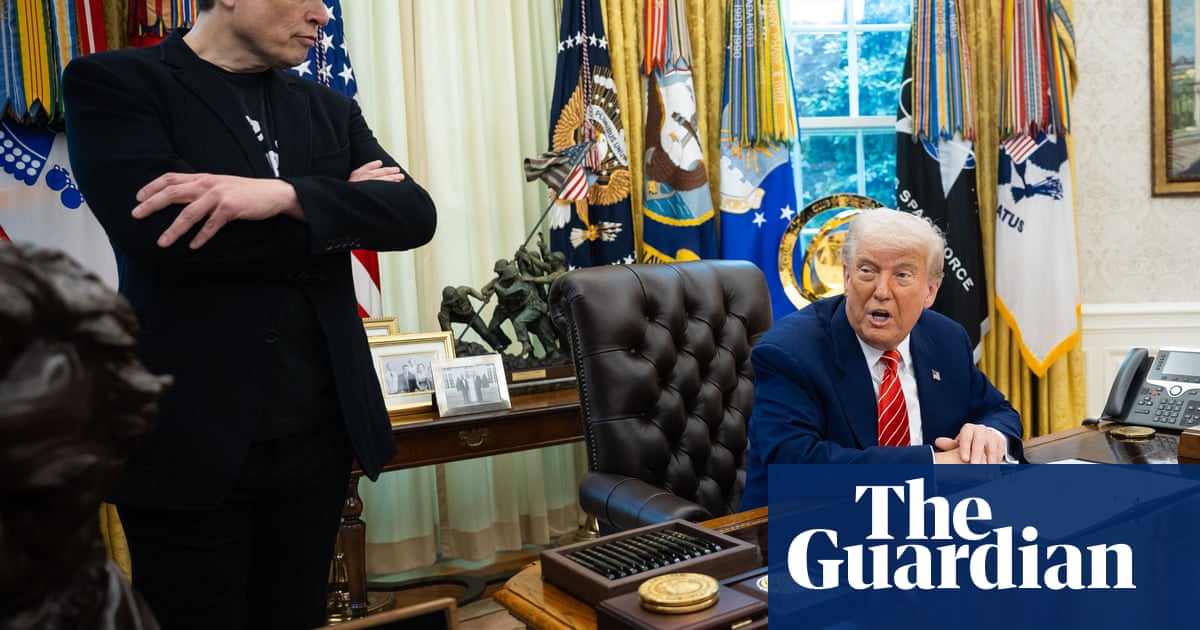Donald Trumpsaid on Thursday he was “very disappointed” withElon Musk, after the Tesla CEO and former head of the president’s “department of government efficiency” (Doge) spent days attacking the tax and spending plan Republicans are working to pass through the Senate.
Trump accused Musk of turning againstthe billbecause of its provisions revoking incentives for consumers to purchase electric vehicles that had been approved by Congress during Joe Biden’s term.
“I can understand that, but he knew every aspect of this bill. He knew it better than almost anybody, and he never had a problem until right after he left,” Trump said in the Oval Office as he welcomed the German chancellor, Friedrich Merz. “I’m very disappointed in Elon. I’ve helped Elon a lot.”
Trump also said at one point: “Elon and I had a great relationship. I don’t know if we will any more.”
Musk almost immediately rejected the president’s statement, writing on X: “False, this bill was never shown to me even once and was passed in the dead of night so fast that almost no one in Congress could even read it!”
The tech boss’s criticism has become the latest obstacle facing the One Big Beautiful Bill Act, which theHouse of Representativesapproved last month by a single vote. The bill is expected to extend tax cuts enacted during Trump’s first term in 2017, step up spending on deportations, border fortifications and the military, and impose funding cuts and work requirements on federal safety net programs to partially offset its costs.
The measure is nonetheless expensive, with the non-partisan Congressional Budget Officeestimatingit will add $2.4tn to the deficit over the next 10 years. Arguing that cost is unaffordable, Musk has made dozens of posts on X criticizing the proposal in recent days, including referring to it as “the Debt Slavery Bill” and encouraging people to call their lawmakers and ask them to vote against it.
Musk has also warned it would undo the efforts of Doge, the Trump-sanctioned initiative he stepped down from leading last week after months of directing its layoffs of federal workers and cancellations of programs. So far, the initiative has saved less than 20% of the $1tn Musk said it could cut.
The House speaker,Mike Johnson, spent weeks negotiating with his fractious Republican majority to get the bill passed narrowly through his chamber, and on Wednesday said he had been trying to speak with Musk about his concerns. In an interview with Bloomberg TV on Thursday, he called the Tesla CEO “a good friend” and said the two had exchanged text messages ahead of a call he expected to take place that morning.
“I just want to make sure that he understands what I think everybody on Capitol Hill understands. This is not a spending bill, my friends, this is a a budget reconciliation bill. And what we’re doing here is delivering the America first agenda,” Johnson said.
“He seems pretty dug in right now, and I can’t quite understand the motivation behind it,” the speaker added.
The ”big, beautiful bill” is now being considered by the Senate, where Republican leaders have shown no indication that they share Musk’s concerns. Instead, they are eyeing changes to some aspects of the bill that were the result of hard-fought negotiations in the House, and could throw its prospects of passage into jeopardy.
One issue that has reappeared is the deductibility of state and local tax (Salt) payments, which the tax bill passed under Trump in 2017 limited to $10,000 per household. HouseRepublicansrepresenting districts in Democratic-run states that have higher tax burdens managed to get a provision increasing the deduction to $40,000 into the One Big Beautiful Bill Act.
But there are almost no Republican senators representing blue states. The majority leader, John Thune, said after a meeting with Trump on Wednesday that his lawmakers were not inclined to keep that provision as they negotiate the bill.
“We also start from a position that there really isn’t a single Republican senator who cares much about the Salt issue. It’s just not an issue that plays,” Thune said.
That could upset the balance of power in the House, where Republicans can lose no more than three votes on any bill.
